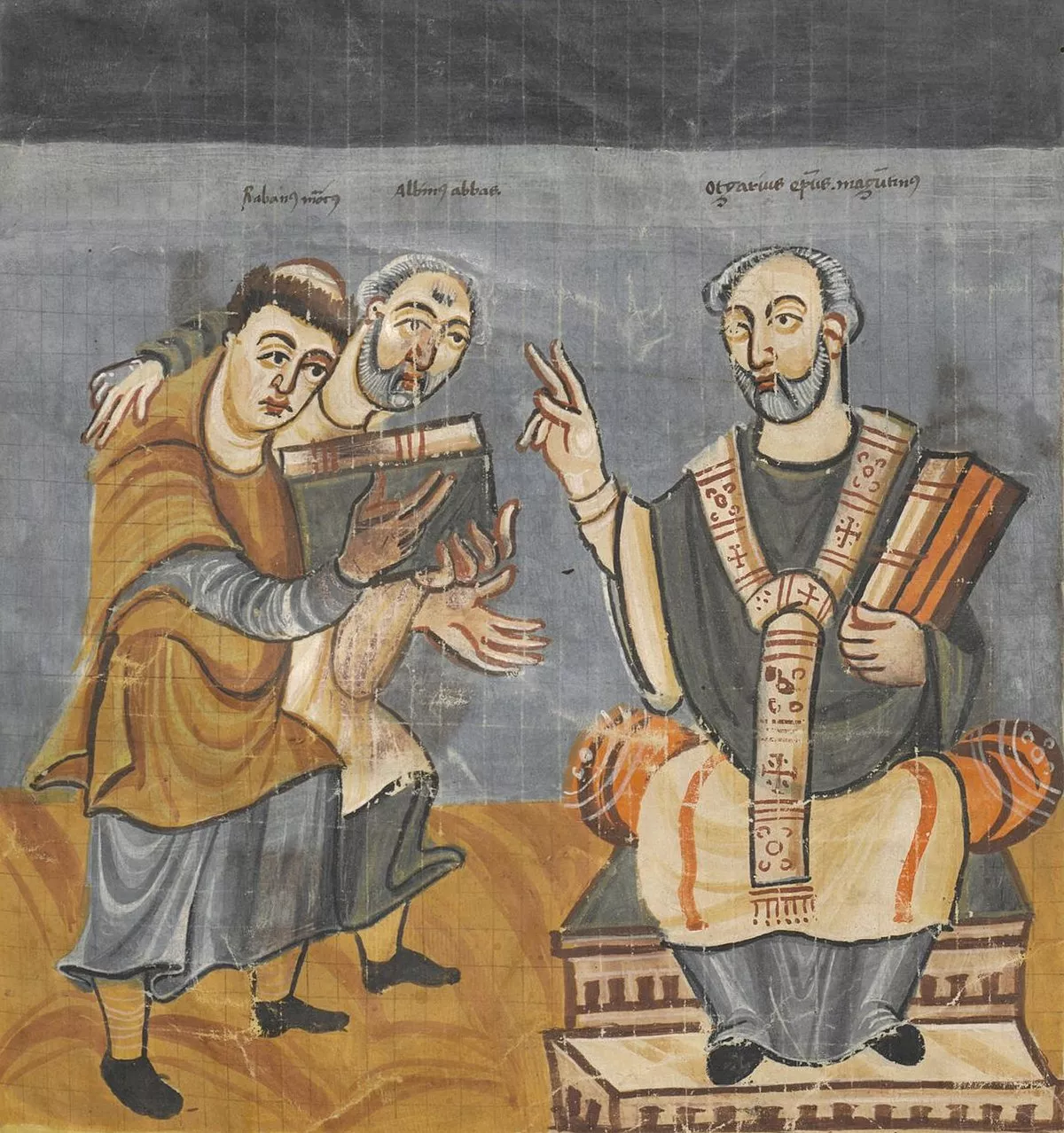 1.
1. Alcuin was born around 735 and became the student of Archbishop Ecgbert at York.

 1.
1. Alcuin was born around 735 and became the student of Archbishop Ecgbert at York.
Alcuin wrote many theological and dogmatic treatises, as well as a few grammatical works and a number of poems.
Alcuin was born in Northumbria, presumably sometime in the 730s.
The young Alcuin came to the cathedral church of York during the golden age of Archbishop Ecgbert and his brother, the Northumbrian King Eadberht.
Ecgbert was devoted to Alcuin, who thrived under his tutelage.
From here, Alcuin drew inspiration for the school he would lead at the Frankish court.
Alcuin revived the school with the trivium and quadrivium disciplines, writing a codex on the trivium, while his student Hrabanus wrote one on the quadrivium.
Around the same time, Alcuin became a deacon in the church.
Alcuin joined an illustrious group of scholars whom Charlemagne had gathered around him, the mainsprings of the Carolingian Renaissance: Peter of Pisa, Paulinus II of Aquileia, Rado, and Abbot Saint Fulrad.
Alcuin became master of the Palace School of Charlemagne in Aachen in 782.
From 782 to 790, Alcuin taught Charlemagne himself, his sons Pepin and Louis, as well as young men sent to be educated at court, and the young clerics attached to the palace chapel.
Alcuin soon found himself on intimate terms with Charlemagne and the other men at court, where pupils and masters were known by affectionate and jesting nicknames.
In 790, Alcuin returned from the court of Charlemagne to England, to which he had remained attached.
Alcuin dwelt there for some time, but Charlemagne then invited him back to help in the fight against the Adoptionist heresy, which was at that time making great progress in Toledo, the old capital of the Visigoths and still a major city for the Christians under Islamic rule in Spain.
Alcuin is believed to have had contacts with Beatus of Liebana, from the Kingdom of Asturias, who fought against Adoptionism.
At the Council of Frankfurt in 794, Alcuin upheld the orthodox doctrine against the views expressed by Felix of Urgel, an heresiarch according to the Catholic Encyclopedia.
Alcuin hoped to be free from court duties and upon the death of Abbot Itherius of Saint Martin at Tours, Charlemagne put Marmoutier Abbey into Alcuin's care, with the understanding that he should be available if the king ever needed his counsel.
Carolingian minuscule was already in use before Alcuin arrived in Francia.
The majority of details on Alcuin's life come from his letters and poems.
Alcuin's sequence is the solution to one of the problems of that book.
Alcuin engaged in textual criticism of the Vulgate, which had many variant readings in his time.
Alcuin opposed the adoptionist Christology advanced by Felix of Urgell and Elipandus of Toledo, two bishops from Iberia.
Besides his fame as an educator and a theologian, Alcuin was the principal agent of the liturgical reform accomplished under the authority of Charlemagne.
The work of Alcuin which had the greatest and most lasting influence in this direction was the missal which he compiled; prescribed as the official liturgical book of the Frankish church, Alcuin's missal soon came to be commonly used throughout Europe and was largely instrumental in bringing about uniformity in respect to the liturgy of the Mass in the whole Latin Church.
Alcuin made the abbey school into a model of excellence and students flocked to it.
Alcuin had many manuscripts copied using outstandingly beautiful calligraphy, the Carolingian minuscule based on round and legible uncial letters.
Alcuin wrote many letters to his English friends, to Arno, bishop of Salzburg and above all to Charlemagne.
Alcuin trained the numerous monks of the abbey in piety, and in the midst of these pursuits, he died.
Alcuin wrote several theological treatises: a De fide Trinitatis, and commentaries on the Bible.
Alcuin is credited with inventing the first known question mark, though it did not resemble the modern symbol.
Alcuin transmitted to the Franks the knowledge of Latin culture, which had existed in Anglo-Saxon England.
Alcuin is venerated as a Saint by Eastern Orthodox Christians in the British Isles and Ireland.
In January 2020, Alcuin was the subject of the BBC Radio 4 programme In Our Time.
In December 2024, Alcuin was prominently featured in a Part 2 of a 3-part podcast series on Charlemagne in The Rest Is History.